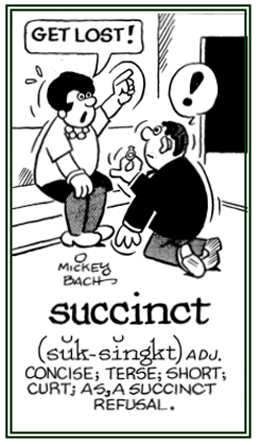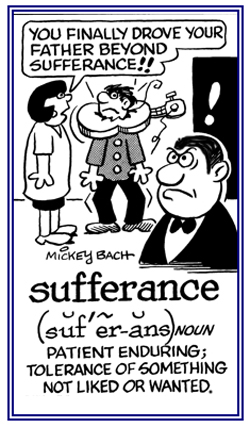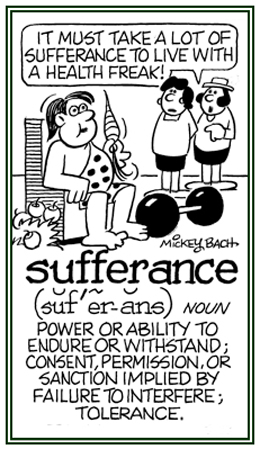sub-, suc-, suf-, sug-, sum-, sup-, sur-, sus-, su-
(Latin: under, below, beneath; used as a prefix as shown in various formats below)
The prefix sub- often becomes suc- before c: succumb.
The prefix sub- often becomes suf- before f: suffuse.
The prefix sub- often becomes sug- before g: suggest.
The prefix sub- often becomes sum- before m: sumptuous.
The prefix sub- often becomes sup- before p: suppression.
The prefix sub- often becomes sur- before r: surrogate.
The prefix, sub- is often simplified to su- before sp; as seen in suspect, suspend, suspicion, suspension, et al. Before c, p, and t; it is sometimes formed into sus-.
2. Characterizing a thought, an idea, a view, etc. in clear, precise, and brief expressions using few words; concise and terse: Tim tried to shorten his essay of 15 pages into a succinct version of only 2 pages and avoid all the wordy and drawn-out explanations which were not absolutely necessary.
Little Mary asked her mother for the 5th time if she could watch a crime movie on TV and her mother gave her a succinct, curt, and snappy answer and said, "No!"
3. Etymology: from Latin succinctus, "prepared, ready, contracted, short"; from succingere, "tuck up (clothes for action), gird from below"; from sub, "below" + cingere, "to gird".

Go to this Word A Day Revisited Index
so you can see more of Mickey Bach's cartoons.
Some people are convinced that it is the responsibility of everyone to succor those who are in need or "to do for others what we would want others to do for us".
The children appeared to be very sad because they suffered the loss of Sammy, their pet gold fish.


Go to this Word A Day Revisited Index
so you can see more of Mickey Bach's cartoons.
Ever since he was born, Jasper has been a sufferer of a physical condition which made it impossible for him to hear anything.
2. To experience something that is unpleasant; such as, defeat, destruction, or loss: These days, so many people are facing more suffering conditions because of the wars that are taking place or as a result of terrible weather situations involving flooding or a lack of sufficient rain.
2. Etymology: from Latin sufficere "to put under, to meet the need of"; from sub-, "under" + facere, "to make".

Go to this Word A Day Revisited Index
so you can see more of Mickey Bach's cartoons.
Suffixes are also defined as groups of letters placed at the end of words to modify their meanings or to change them for different grammatical functions; for example, from adjectives to adverbs, etc.
2. Something added to the end of of something else: The suffix of the evening meal at June's birthday party was the singing of "Happy birthday" by the guests.2. To include or to attach something to the end of another item: After asking his mother if he could go to the movie with his girlfriend, he made sure to suffix his request with, "please".


